Food and Drink: Special Occasion Foods
National and Public Holidays
Silvester (New Year's Eve)
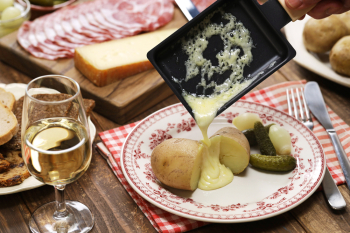
On New Year’s Eve, friends and family gather for raclette (melted cheese typically served with boiled potatoes). Each person grills the meats and vegetables of their choice on a small tabletop grill. These ingredients are then put in small trays and topped with smoked raclette cheese. A festive beverage served both during the Christmas season and at New Year’s parties is the Feuerzangenbowle (literally “fire tongs punch”), a potent alcoholic drink where a sugar cone is set on fire and dripped into mulled wine.
German Unity Day (Tag der Deutschen Einheit)
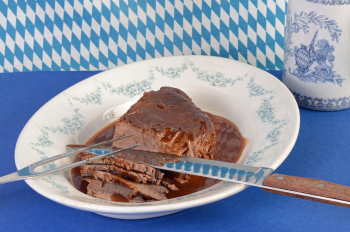
German Unity Day, celebrated on October 3, marks the reunification of East and West Germany in 1990. The day is a time for national pride, and food plays a key role in the celebration. Regional specialties are often highlighted, such as bratwurst and sauerbraten (beef pot roast). Bread and brezeln (pretzels) served with mustard or obatzda (a Bavarian cheese spread) are popular at public festivals. The food served on German Unity Day reflects the diverse regional culinary traditions that unite the country.
Religious and Spiritual Occasions
Christmas (Weihnachten)
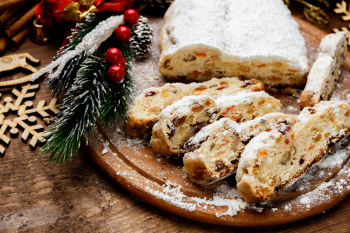
Christmas in Germany is a deeply festive occasion centered around family gatherings and traditional foods. The traditional meal on Christmas Eve is the Weihnachtskarpfen (Christmas carp), as historically Catholic churches forbade eating meat during the Advent season until Christmas day. On Christmas morning, it is tradition to take the carp bones and innards from the previous night’s Weihnachtskarpfen and bury them under the fruit trees in one’s garden to bring luck and a bountiful harvest in the next year.
The main Christmas meal typically features roast goose or duck served with red cabbage, dumplings, and gravy. A highlight of the season is lebkuchen (gingerbread) and stollen, a fruit bread dusted with powdered sugar. German Weihnachtsmärkte (Christmas markets) are an iconic part of the Adventzeit (Advent period). Around the country, families and friends meet in the town square, where vendors sell tasty treats such as glühwein (warm mulled wine), reibekuchen (fried potato pancakes served with apple sauce), maronen (roasted chestnuts), and lebkuchen (gingerbread). The food during Christmas is rich and hearty, symbolizing warmth and abundance, with meals bringing families together in celebration.
Easter (Ostern)
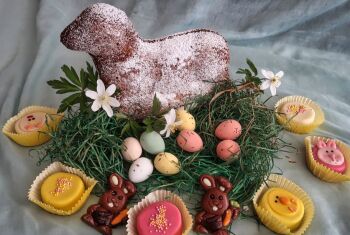
Easter in Germany is both a religious and family celebration, beginning on Thursday and ending on Sunday. On Gründonnerstag (Maundy Thursday), green dishes or soups are usually eaten, as the name means “green Thursday” in German. A fish meal, usually featuring herring or trout, is served on Karfreitag (Good Friday).
The Easter meal traditionally includes roast lamb, representing humility and innocence, served with spring vegetables such as asparagus and potatoes. Easter bread, called osterbrot, is a sweet loaf decorated with colored eggs. Osterlamm, a lamb-shaped cake, is another popular treat. The focus on fresh, seasonal ingredients and symbolic foods reflects the themes of renewal and rebirth associated with Easter, with food serving as a way to mark the end of Lent and the arrival of spring.
Life Milestones and Personal Celebrations
Weddings
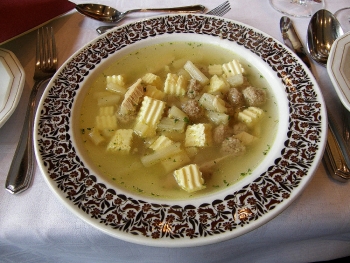
German weddings are grand occasions where food plays a central role. Hochzeitssuppe (wedding soup), a clear broth with vegetables, noodles, bone marrow meatballs, and sometimes dumplings, is traditionally served as a starter. This soup has its origins in village life when a large yet satisfying dish had to be prepared to serve hundreds of guests, many of whom had to bring their own dishes and silverware to the festivities.
The wedding feast typically includes a multi-course meal with dishes such as sauerbraten (pot roast), schnitzel (pounded, breaded, and fried meat), and potato salad. The wedding cake, often a multi-tiered fruitcake or buttercream cake, is cut ceremonially. Food at German weddings symbolizes abundance and joy, with the meals reflecting the importance of bringing families together to celebrate the union of the couple.
Birthdays
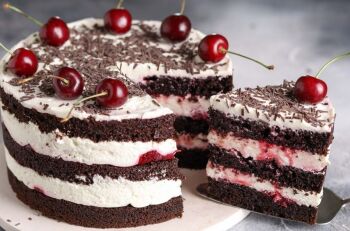
Birthday celebrations in Germany are often marked with a special breakfast, featuring freshly baked rolls, cold cuts, cheese, and jam. Later in the day, coffee and cake are served, with käsekuchen (cheesecake) or schwarzwälder kirschtorte (black forest cake) being popular choices. For children’s birthdays, foods such as sausage rolls, brezeln (pretzels), and frikadellen (German meatballs) are common. Birthday foods in Germany emphasize indulgence and festivity, with the cake being the highlight of the celebration, often accompanied by candles and well-wishes.
Cultural and Regional Festivals
Oktoberfest
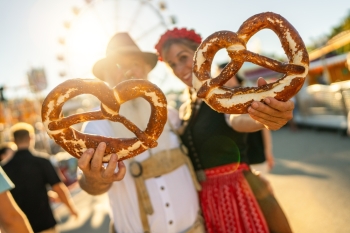
Oktoberfest, taking place annually in Munich, is Germany’s most famous cultural festival, celebrating Bavarian traditions. The food is as much a part of the celebration as the beer. Traditional dishes include roast chicken, weißwurst (a white sausage served with sweet mustard), schweinshaxe (roast pork knuckle), and laugenbrezeln (large soft pretzels). Desserts such as apfelstrudel and kaiserschmarrn (shredded pancakes with fruit) are popular. The food at Oktoberfest reflects Bavaria’s rich culinary heritage, with hearty meals designed to be enjoyed with large steins of local beer in a communal setting.
Karneval (Fasching)
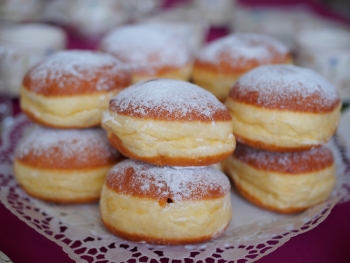
Karneval, or Fasching, is Germany’s version of Carnival, celebrated in the lead-up to Lent. It’s a time of indulgence and fun before the fasting season. Popular foods include jam-filled doughnuts called krapfen (known as Berliners in Western Germany) and bratwurst. In the regions of Cologne and Mainz, street vendors offer hearty snacks such as sausages and brezeln (pretzels). The food during Karneval emphasizes indulgence, with sweets and fried treats playing a central role, reflecting the celebratory and carefree spirit of the event.
St. Martin’s Day (Martinstag)
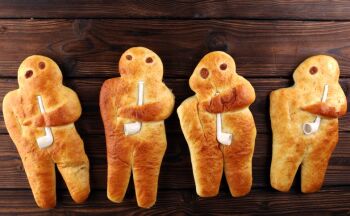
St. Martin’s Day, celebrated on November 11, honors St. Martin of Tours and marks the beginning of winter in Germany. The traditional meal for the day is roast goose, served with red cabbage and dumplings. This feast commemorates the charitable deeds of St. Martin, who famously shared his cloak with a beggar. Children also partake in lantern processions, and Stutenkerl, a sweet bread shaped like a man, is often shared. The food during St. Martin’s Day reflects both religious symbolism and the celebration of the harvest season.
Cannstatter Volksfest
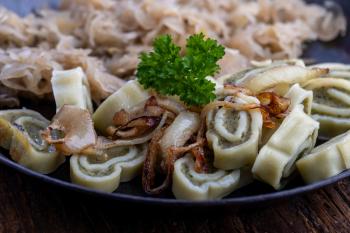
Cannstatter Volksfest, taking place in Stuttgart, is one of Germany’s largest beer festivals after Oktoberfest. The food at the festival highlights Swabian cuisine, with dishes such as maultaschen (meat-filled dumplings), spätzle (egg noodles), and zwiebelrostbraten (onion roast beef). Laugenbrezeln (large soft pretzels) and sausages also are popular, alongside local beer. The food at Cannstatter Volksfest celebrates the rich culinary traditions of the Swabian region, with hearty, comforting dishes served in a lively, communal atmosphere.
Christkindlesmarkt
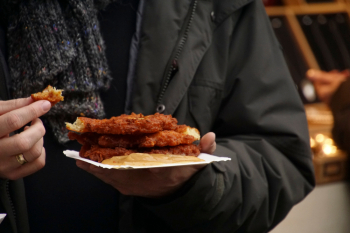
The Christkindlesmarkt, or Christmas market, is a beloved tradition in many German cities during the Advent season. The markets are filled with food stalls offering seasonal treats such as lebkuchen (gingerbread), glühwein, and roasted almonds. Bratwurst, kartoffelpuffer (potato pancakes), and Stollen are also widely enjoyed. The food at the Christkindlesmarkt is festive and comforting, designed to be enjoyed while browsing the stalls and embracing the holiday spirit. The markets reflect the warmth and joy of the Christmas season, with food bringing people together in celebration.
Copyright © 1993—2024 World Trade Press. All rights reserved.

 Germany
Germany